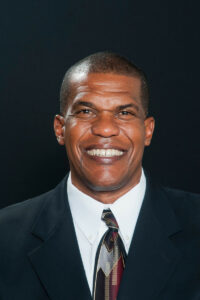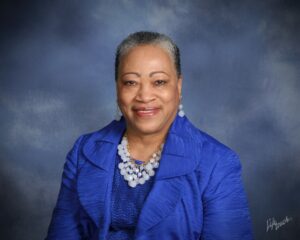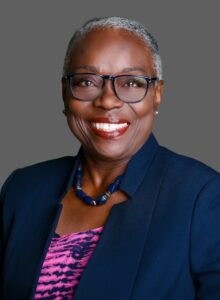By R.V. Baugus
In celebration of Black History Month, IAVM’s monthly E3 series last month highlighted the achievements of African Americans in the public assembly venue industry.
Moderated by Robyn L. Williams, CVE – Executive Director, Portland’5 Centers for the Arts (Past Chair IAVM Board of Directors, Past Chair of the IAVM Foundation Board of Trustees, Past Chair Diversity & Inclusive Leadership Committee, 2008 Ray Ward Award and 2018 McElravy Award), the decorated and accomplished panelists included Jimmy D. Earl, CVE – Retired, Frank Erwin Center, Senior Associate Athletics Director (Past President/Chair of IAVM Board of Directors, 2016 McElravy Award); Mina Y. Boyd, CVE – Retired (2020 Foundation Legacy Award); Adonis “Sporty” Jeralds, CVE – Assistant Dean for Diversity & Inclusion–Senior Instructor, University of South Carolina (2018 Education & Service Award); and Carol Wallace – President & CEO, San Diego Theatres/San Diego Civic Theatre (Past President/Chair of IAVM Board of Directors, 2015 Lifetime Achievement Award, Chair Citation Award in 2005 and 2016, 2004 McElravy Award).
In case you were not able to participate to glean the comments and insights from the panel on many important issues relating to African Americans in the public assembly venue industry, we caught up with some of the panelists to get some extra thoughts beyond their panel comments.
Bear in mind that the distinguished veteran panelists all got their starts in the profession many years ago, at a time when as people of color it was not easy to get into and advance in the industry.
“This is an important question to me because I feel like I owe my career to Andy Greenwell,” Sporty Jeralds  said. “Andy was a 50-year-old white guy and I was a 24-year-old Black kid when I started as an intern with him at the Hampton Coliseum. He saw something in me during that internship and created a full-time job for me based on my limited industry experience. He allowed me to fail, took me to VenueConnect and believed I could become a venue manager. I would encourage our industry that is still predominantly white to find opportunities to embrace potential venue managers who do not look like them.”
said. “Andy was a 50-year-old white guy and I was a 24-year-old Black kid when I started as an intern with him at the Hampton Coliseum. He saw something in me during that internship and created a full-time job for me based on my limited industry experience. He allowed me to fail, took me to VenueConnect and believed I could become a venue manager. I would encourage our industry that is still predominantly white to find opportunities to embrace potential venue managers who do not look like them.”
Mina Boyd totally agrees with that assessment.
“When I realized there would be extremely limited opportunities to advance in the industry, I made the decision to learn as much as I could by taking on activities within my department that went beyond my role as Event Manager,” she said. “When I also saw that my salary would not increase in order to enable me to handle my personal responsibilities, I chose to expand my education, which paid off almost immediately. Not knowing whether or not I would remain in venue management, I pursued and achieved a Master of Science Degree in Public Administration. I was hired as Executive Director of the Kansas City Convention and Special Event Facilities in less than a year of receiving my graduate degree.”
Wallace captured a word often mentioned today about employers at that time — though few and far between — being intentional in their hiring.
“For me, it was an industry leader who decided they wanted increase the diversity in their organization so they made a conscious recruitment effort,” she said. “Then they guided, supported, and mentored my professional development.”
It was only a few years ago that the word “diversity” was all the talk, and it has seemingly taken many years for people to fully understand that the definition of the word goes far beyond black and white. Likewise, today “inclusion” is a word bandied about in conversation circles. IAVM, like many of its member venues, seeks to be truly inclusive, a position that the panelists were eager to discuss.
“For IAVM to be truly inclusive, I believe it is going to take intentional strategies by venue general managers,” Jeralds said. “I say with all sincerity that if a young person has the desire and willingness to work the long hours our business requires along with the ability to get along with all different types of people they can be successful in our business. When positions are available in venues, general managers must challenge their human resource departments to find diverse candidates. I know there are qualified people out there if you search hard enough. Like industries such as hotels and sports councils as well as HBCUs are great places to find diverse candidates. And if there aren’t any qualified candidates, hire a diverse candidate and invest in them long enough for them to be qualified. A good rule of thumb is to try to have your staff mirror the demographics of the community. For instance, if your community is 27% African American, a great goal is that your full-time staff should reflect that 27%. Diversity is not always easy, but it is always worth it!
 “”Success to me is when BIPOC is a term of the past where skin color, gender, and ethnicity do not define who we are,” Boyd added. “I might be overly optimistic but I believe it can be achieved within IAVM. A recent documentary asked the question, “How Can You Hate Me If You Don’t Know Me?” If members don’t establish relationships and get to know others who appear to be different, they cannot be truly inclusive.
“”Success to me is when BIPOC is a term of the past where skin color, gender, and ethnicity do not define who we are,” Boyd added. “I might be overly optimistic but I believe it can be achieved within IAVM. A recent documentary asked the question, “How Can You Hate Me If You Don’t Know Me?” If members don’t establish relationships and get to know others who appear to be different, they cannot be truly inclusive.
“Therefore, I would suggest that IAVM develop a program that actually seeks potential BIPOC members through a program similar to the one Sporty promoted years ago with ”Each One Reach One.” I would suggest “Each One Teach One.” In other words, offering an opportunity for IAVM leaders to take one person under their wing as an assigned mentor. This could be through a summer high school program, for college junior or senior internship, etc., that would be exclusively sponsored by IAVM in collaboration and coordination with venue managers. It could also include those who are new to the industry. When we actually know each other, we can be more accepting of those who look different from us and are from different cultural backgrounds.”
Wallace believes that there is a direct solution.
“Clearly identify the path to leadership and develop training opportunities,” she said.
As far as being a Black leader in a predominantly white industry, Boyd said brushing off skin color keeps her from getting caught up in the actual words of black and white. Boyd, of course, had an added challenge as not just an African American, but a female breaking in to the industry.
“I actually do not wake up thinking that I am of African American descent,” she said. “I am not a fan of the terms black and white or people of color to describe us as Americans. We are all homo sapiens who have varying degrees of skin pigmentation. The terms to identify us by color originated as a Jim Crow measure to separate us. Therefore, I think of myself first as a competent, relatively intelligent person who loves people and involvement. I am proud of my heritage and the strength of my forefathers. I try to model their characteristics in my efforts to achieve. I strive to be a positive role model and not allow discrimination to deter me from my goals. As a black leader, I want others to see something different in me, so that they will have a desire to make a difference also. My priorities are integrity, skills, leadership, and mentoring with the color of my skin taking the lowest priority. I would hope that my fellow industry leaders who have lighter colored skin would have similar priorities.
That said, Boyd cited examples in her past where racism came about as a quest for power from others who ignorantly (our word) chose not to get to know her as a person.
“I experienced my greatest incidents of racism with the Convention and Visitors Bureau executives in several of the places where I worked,” she said. “I attributed their attitudes to a quest for power because they never took the opportunity to know me, the person. They knew me for my position and could not fathom that a ‘Black’ woman could successfully handle the responsibilities I was given. I never discovered whether or not my ‘white’ male counterparts experienced the same level of discrimination. I worked very hard to not take their slights personally, even though it was hurtful. Getting into a contest with them would have been counterproductive; therefore, I focused more so on the job at hand while maintaining my dignity with a quiet strength. I am certain that my demeanor confused them.”
There is nothing confusing to us about the attributes of leadership from each member who participated in this important and eye-opening panel. They lead through example, deeds, action, and, indeed, the desire to first and foremost know the hearts of others as they have hoped others have made the effort to know their hearts.
To view the full E3 panel discussion, click here.
